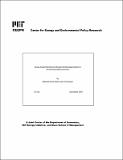| dc.contributor.author | Greenstone, Michael | en_US |
| dc.contributor.author | Gayer, Ted | en_US |
| dc.contributor.other | Massachusetts Institute of Technology. Center for Energy and Environmental Policy Research. | en_US |
| dc.date.accessioned | 2009-04-09T20:05:19Z | |
| dc.date.available | 2009-04-09T20:05:19Z | |
| dc.date.issued | 2007 | en_US |
| dc.identifier | 2007-013 | en_US |
| dc.identifier.uri | http://hdl.handle.net/1721.1/45128 | |
| dc.description.abstract | This paper argues that an increased application of quasi-experimental and experimental techniques will improve understanding about core environmental economics questions. This argument is supported by a review of the limitations of associational evidence in assessing causal hypotheses. The paper also discusses the benefits of experiments and quasi-experiments, outlines some quasi-experimental methods, and highlights threats to their validity. It then illustrates the quasi-experimental method by assessing the validity of a quasi-experiment that aims to estimate the impact of the Endangered Species Act on property markets in North Carolina. The paper's larger argument is that greater application of experimental and quasi-experimental techniques can identify efficient policies that increase social welfare. | en_US |
| dc.format.extent | 58 p | en_US |
| dc.publisher | MIT Center for Energy and Environmental Policy Research | en_US |
| dc.relation.ispartofseries | MIT-CEEPR (Series) ; 07-013WP. | en_US |
| dc.title | Quasi-experimental and experimental approaches to environmental economics | en_US |
| dc.type | Working Paper | en_US |
| dc.identifier.oclc | 244571875 | en_US |
